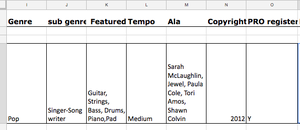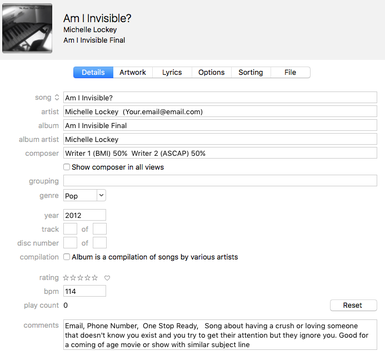Tuesday
Apr252017
 April 25, 2017
April 25, 2017 Metadata Schemetadata? Here's Why You Should Care
Why should you care about metadata??by Michelle LockeyMetadata. Google defines metadata as: a set of data that describes and
gives information about other data. So how does this apply to music?
Well, imagine you have burned this wonderful CD of music that you are
going to hand to music professionals at a music conference.
The music is your latest and greatest. You meet some professionals,
publishers& music supervisors and give them your CD.
They go back to their office, put the CD into their computer and then they see:
DOH!!! They may love the song, but now it is lost in a myriad of
song files they have with no way of contacting you. Sure, they may have the
CD cover,somewhere, but usually the songs are uploaded into their vast database
and can get lost forever.
So tagging your files with the appropriate metadata
will save YOU fromthis problem and help THEM find you music and contact you.
But it does more than that. Understanding how to tag the files appropriately,
keep a music catalog with these tags, and use the tags when submitting to music libraries
and Music Supervisors, can make your music more visible and findable
in this vast music universe.
Here is a list of the tags that you should fill out for each song.
Start with a song catalog spreadsheet. One column for each title.
Then you can add them to your mp3 files as well. Use iTunes itself to tag files or Mp3tag.
You can even have your Mastering engineer embed some of the data
into the file itself.
In the mp3, I would have your email next to the artist or song name and
even phone number so the music supe doesn’t have to go digging
for your information. Remember that wav files do not retain this info.
So, if your music is NOT released, burn an mp3 CD or enter the information
into the Gracenotes database.
See how to do this here:
If your music has been released then you won’t have the issue of
Track 1, Track 2 etc. Because iTunes will automatically find it from the Gracenotes database.
At least your name, and general info will be on the track.
Keywords and Moods
Be as inventive as you can. Use a thesaurus to come up with various
ways to describe moods, style, what the song can be used for, etc.
For a song that is “Happy” Just don’t say “Happy and Fun”
Also say, bouncy, joyful, playful, bright, lovely, snuggly, warm, crunchy,
car commercial, kids party etc… Make sure you have a list of
all the instruments used in the song as well. The more descriptive you can be the better.
Keeping these words in a spreadsheet or
database will help you save time when submitting music.
Each library/publisher has their own forms they want you to fill out,
so it is easier to have these all in one place to copy
from or easily fill out a checklist.
Sound Alike Artists or “Ala’s”
Use a google search and go to the Last.fm link that comes up.
Try for at least 5 soundalikes. Here is a link from a search I did for
“Sounds like Sarah McLachlan” https://www.last.fm/music/Sarah+McLachlan/+similar
I listened through some of the artist’s music that were displayed
on that page and took five to put on my list.
That will help when describing your music and most
publishers want that when filling out their forms.
Start a catalog spreadsheet today, or use a database like Composer Catalog (Composercatalog.com) .
If you don’t have the time, resources or knowledge
to tag your files yourself, you can use a service like Tagteamanalysis.com
They will tag your files for about $4 a song.
Making sure that you have the proper metadata
information will make your songs and YOU more visible and easy to contact.
And we all want that!
Happy Metadata Tagging! - Michelle Michelle Lockey is owner of Michelle Lockey Music and Licensing Songs Academy.
She is committed to giving back to the community by sharing her knowledge on Music Licensing
#metadata #music #musicians #musiclicensing #synclicensing #blog #entreprenuer #iTunes #mp3 #tagging |











Reader Comments (1)
https://www.reverbnation.com/cam247